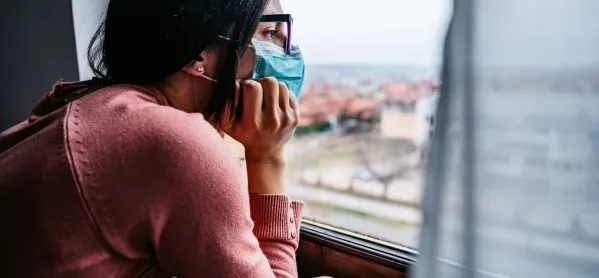Workload: Covid taught me how to listen to my health

Despite being the most shielded non-vulnerable person in the world (because I look after my 90-year-old mum), I managed to catch Covid-19 at the start of November and I lost a month. I’ve not been in a shop since March, so having the virus made me slightly wish I’d partied when I could.
I wasn’t even very sick, at least not what I thought of as sick - take-to-my-bed, constantly-feverish, shivering-coughing-puking sick. I had the classic and very strange symptom of losing my taste and smell (not gradually but immediately) and a concurrent sore throat which was almost certainly a bacterial tonsillitis that weakened my immune response and let it in. I spent three-quarters of November feeling like a fraud.
Coronavirus: ‘We’re proud to be playing a part in the vaccine rollout’
Background: Colleges in hard-hit areas to benefit from mass testing
Christmas contact tracing: Rules for FE providers
But. When it dropped me, it really dropped me. It was like being mugged. I passed out twice - scary, as I live on my own - and I had fevers where I didn’t know my own name. There was a whole day when I couldn’t wee (sorry, TMI) and I could feel the virus attacking my kidneys. I took to carrying paracetamol and a flask of hot Vimto around the house for when fever struck. But I’m relatively young, robust and healthy. I’d spent the summer getting fit and my body fought like a champ. It’s gone now, but I’m a bit of a husk. Exhausted from the fight, I’m still battling brain fog and a flare-up of allergies, which took hold when my immune system was busy elsewhere.
Everyone experiences Covid differently. This virus is a paradigm shift and it has humbled the world, challenging what we think we know. It’s a moment of hubris for the human race, a central jeopardy in our story. It challenges what it is to be sick, and to be “off sick”.
Obviously, I’m a freelancer and when I did pop up to do some work, I think people saw that as me doing what I had to do to keep a roof over my head with no sick pay. Truthfully, I worked when I was well enough to work and I was lucky that fever didn’t hit during any of my face-to-face commitments. Had it done so, I could not have met them and I wouldn’t have felt guilty about that. I could only work from home for quarantine reasons but travelling would have tired me unnecessarily anyway.
It’s different when we work for an organisation. “Human resources” (not always very responsive to humanity), like all manifestations of capital, demand a binary. We’re either sick or we’re well. And that works both ways. I remember coming back from India with the parasite giardia (fluorescent poo, also TMI) and taking a fortnight off work while a colleague battled into work with the same unwelcome visitor. Today, we’d call them a public health risk. Then, they were seen as being more dedicated than me.
Wellness - physical and mental - is on a spectrum and recovery is never linear, and certainly not recovery from Covid. It is my sincere hope that all we have learned about digital connection will empower organisations to take a leap of faith with staff and allow all of us to take responsibility for being truthful about our health. “I can do this, but not that, and today but maybe not tomorrow” was very real for me in November. And not being infantilised by HR processes (designed by people) more than makes up for no sick pay in my world right now.
These days, we make finely judged public-health decisions all the time. I’ve got a public health master’s and I still find it difficult to hunt down the research I need, through all the fake news and manipulative messaging. As human beings, we can be taught to process information and we can be trusted to make decisions for ourselves, scaffolded for some of the journey but always working towards independent, informed thinking.
Unique in human history, our survival right now depends on us being independent thinkers. Why are we not reconfiguring FE to make this happen?
I’m recovering, though I still need to put out all-channels bulletins on social media to remind people I can’t make up weeks’ worth of work in a day. Plates have been dropped, and that’s OK. No lives depend on my work. But we can learn from this. No one is better placed than us to make a significant contribution to how we can live and learn differently from now on.
And, in case you’re wondering, my mum is really well. We feel very blessed.
Lou Mycroft is a facilitator, writer and public speaker. She tweets @LouMycroft
You need a Tes subscription to read this article
Subscribe now to read this article and get other subscriber-only content:
- Unlimited access to all Tes magazine content
- Exclusive subscriber-only stories
- Award-winning email newsletters
Already a subscriber? Log in
You need a subscription to read this article
Subscribe now to read this article and get other subscriber-only content, including:
- Unlimited access to all Tes magazine content
- Exclusive subscriber-only stories
- Award-winning email newsletters
topics in this article



